
Related
Topics
As the antiwar vigil at Camp Casey continues outside President Bush’s estate in Crawford, we speak with the Rev. Joseph Lowery, co-founder of Southern Christian Leadership Conference. [includes rush transcript]
The antiwar vigil outside President Bush’s estate in Crawford continues to grow, despite the temporary departure o f Cindy Sheehan to care for her ailing mother.
The demonstrators camped out in the blazing sun have been visited by Folk singer Joan Baez, Democratic Congresswoman Sheila Jackson Lee and actress Margot Kidder. The Canadian citizen said she became a US citizen last week so that she could protest the war in Iraq without being deported.
Democracy Now! broadcast from Camp Casey on Friday and we stayed on through the weekend to cover the story. Military families, longtime activists and Iraq veterans were there. One of those we spoke with was Reverend Joseph Lowery, co-founder of Southern Christian Leadership Conference and chair of Coalition of Peoples Agenda.
- Rev. Joseph Lowery, preacher and co-founder of Southern Christian Leadership Conference and chair of Coalition of Peoples Agenda.
Transcript
AMY GOODMAN: Democracy Now! producer, Yoruba Richen, interviewed Reverend Lowery and asked him why he decided to come to Camp Casey.
REV. JOSEPH LOWERY: Well, I came primarily, I guess, two reasons: one, I’m very supportive of the efforts of these mothers, led by Cindy, to test the conscience of America and to demonstrate what happens when an idea that’s powerful realizes its time has come. And I think the time has come to end this war. And I think that God has worked through this mother and other mothers and fathers and aunts and uncles and citizens from all walks of life to say to America, it’s time to bring the troops home. We have — we are in a quagmire. There’s hardly anything positive that can be accomplished, and we have to weigh whether or not the gamble — and it’s a gamble, it’s a riverboat gamble — that we can stay longer and risk lives and achieve more of our goal. There are no weapons of mass destruction. That’s over. There’s no evidence that al Qaeda or 9/11 were related at all to Iraq. That’s over. Saddam is in prison. That’s over. So, for all real purposes, the war is over. And what countries do when the war is over is bring your troops home.
YORUBA RICHEN: Why — you said it’s an idea whose time has come. Why now? Why this groundswell of support and people coming down to Crawford now?
REV. JOSEPH LOWERY: Well, you know, in the 1950s the swell against segregation and transportation was — the seed was planted by a little woman in Montgomery named Rosa Parks, who sat down in dignity so we could stand up with courage and freedom, and here another woman, you know, later, a half century later, has come to say enough is enough. Too many lives have been lost. We’re reminding us — they’re reminding us of a sacredness of human life and that we have no right to gamble with other people’s children’s lives while our children are snug and safe in their elitist environment.
Now, the time has come, and I believe that God is speaking to us through this movement by the mothers, and we call on the Congress, not just the President. We think Congress has been irresponsible. We call upon Congress to demand that the administration present a plan to withdraw the troops, and if they don’t, that we cut off funding. We have got to be radical. Radicality of change and spirituality demand that we say bring the troops home now. The time — I remember the Battle of New Orleans in the War of 1812 was fought after the war over. And to those who say that to withdraw now is to mean that those who died died in vain, that’s ridiculous. Anyone who dies answering the call of his country has died with honor. You can judge the call, but that’s the country’s — that onus is on the country. The soldier has answered the call and has died with honor. It’s time now not to increase the number of grieving mothers, but hold it where it is and bring the troops home.
YORUBA RICHEN: You mention Rosa Parks and the move to end segregation in transportation, and you’re a veteran of these movements. How does this fit into that continuum of civil rights struggle?
REV. JOSEPH LOWERY: Well, I think it ties peace and justice. It ties love and justice. It ties faith and love. And we talk about faith-based ministries and movements. There can be no authentic faith without grounding in love. The Bible makes it clear that though I have faith to move mountains and have not love, I’m nothing, though I have faith to solve all mysteries and don’t have love. And love is inclusive, love embraces justice, and so the movement in the 1950s against segregation for justice is very much akin to the movement for peace now and for justice, because without, as the young folks say, no justice, no peace.
YORUBA RICHEN: How do you see — you brought a contingent of folks with you, who arrived yesterday. Why was it important for your presence to be here for the people that you brought here?
REV. JOSEPH LOWERY: Well, more than my presence, the presence of those two mothers, two African American mothers, and while we realize the diversity that’s in this war, all of the blood that’s shed is the same color. It’s red and sad. And those two mothers wanted to come. One of them, Pat Roberts’ son, was the first Georgian that died. The other one, Evelyn Allen, her son died in November 2004 from tank fire, friendly fire. So, they wanted to come and identify with this movement. We were glad to make it possible for them. I wanted to be here because it continues the tradition of our movement. Peace has always been a strong and solid root for our movement for justice. They’re all entangled: peace, love, justice, faith. They’re all tied together. Without any one of them, the circle is broken.
YORUBA RICHEN: How do you see the war affecting particularly communities of color? Does it in a different way or in a unique way?
REV. JOSEPH LOWERY: Well, you know, when America has a bad cold, communities of color have pneumonia. And it’s affecting us in many, many ways. It’s a poor man’s war. I said earlier that there’s something wrong about the children of the poor and the moderate risking their lives and dying, while the children of the wealthy and the elite are safe in their cozy, comfortable environment. Something wrong with that, and either we ought to — well, we ought to end the war. That’s the other thing about it. It’s time to bring the troops home, and Congress ought to demand, if the President refuses to, a plan of withdrawal. Peace, peace. Who are we? Are we really a military aggressor? Are we — we’re talking about fighting terrorism. Our activities have created more terrorists than there were when 9/11 occurred. And we seem to have forgotten about that fellow Osama bin Laden and the people who perpetrated. It was not the people of Iraq, and we have lost too many lives, both American and otherwise. It’s time to bring the troops home.
YORUBA RICHEN: Tell me what your feeling was last night, looking out over the crowds of mothers and vets and people who had gathered here. What was the feeling here yesterday?
REV. JOSEPH LOWERY: Well, the minute I arrived on the scene, two emotions reached up and grabbed me. One was indignation that the President has been so insensitive, and here I was within a shadow of his ranch. And I wished I could call out to him and ask him to come, and not only meet with Cindy, but let’s say a prayer together. Let’s ask God’s guidance for what we ought to do about peace and justice in the world. And then the other emotion was thankfulness.
I felt a spiritual presence that I haven’t felt in a long time, out in nature where the bugs and the snakes and the frogs were competing for space and comfort. There was a spiritual presence there. Even though Cindy had gone, her presence remained, and the presence of all of those parents and supporters and sympathizers who came from across this country — black, white, brown — to send a message to this administration, it was a tremendous spiritual experience. I take nothing for it. And when I go back home, I want to share it with a woman who has given her life for peace and justice, Coretta Scott King, who is struggling now with courage and dignity, the kind of courage and dignity she has displayed throughout her life. I want to share it with her the first chance I get, that there is a Balm in Gilead, and that there is a movement brewing in the land. And it’s time, it’s time to bring the troops home.
YORUBA RICHEN: And if you were to meet with — if President Bush came out of his ranch this morning, what would you say to him about the whole situation?
REV. JOSEPH LOWERY: I would say, to whom much is given, much is required. He has the power. He has the opportunity to do good, and it’s never too late to do good. And as I said that we can’t afford riverboat gambling. We don’t need to risk the lives of innocent people anymore, here nor there, for a risk. There’s no way we can guarantee we can bring about a thriving democracy in Iraq and the Middle East by the means we are using. There has got to be a better way to bring the community of nations together, and let us not be the killers. Let us not be — you know, I imagine the mothers in Iraq who have awakened in the morning to find their children blown to smithereens by smart bombs sent on dumb missions, that they call the us the terrorists.
YORUBA RICHEN: And after living through Vietnam and through other wars, what does it feel like to be again in this situation here in 2005?
REV. JOSEPH LOWERY: Well, he who doesn’t observe and learn the lessons of history will repeat the mistakes of history. And I think we’re going through it again, and I think that 9/11 traumatized us so that we sort of let the administration slide and go to war without our full awareness and our full participation in the decision. But now I think repentance and change are the order of the day, and it’s time, as the mothers have called us, to bring the troops home.
AMY GOODMAN: Reverend Joseph Lowery, co-founder of the Southern Christian Leadership Conference speaking with Democracy Now! producer, Yoruba Richen. Lowery came to Crawford with Patricia Roberts. Her son was the first soldier from Georgia killed in Iraq. This weekend, she addressed those gathered at Camp Casey.
PATRICIA ROBERTS: My name is Patricia Roberts. My son was specialist Jamaal Addison. He was in the 507 Maintenance Company. He was the unit that took the wrong turn, and he died when the P.O.W.s were taken. It’s an honor to be here today. Unfortunately, not like Miss Montgomery, not like Miss Johnson, I never got to speak to Mr. George Bush. He never came and acknowledged in any way my son. I wish, I pray to get the opportunity to speak to Mr. Bush, and I pray while I’m here until Tuesday that I will be able to see him. I have prayed that he will step up to the plate, and even if he does not come to meet me, that he will note my presence here and that he will do the right thing and bring our troops home.
AMY GOODMAN: Patricia Roberts, her son was the first soldier from Georgia to be killed in Iraq. She was speaking at Camp Casey.

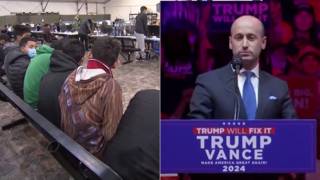
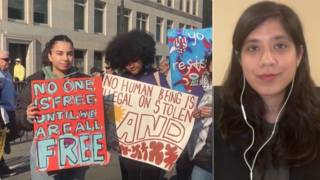
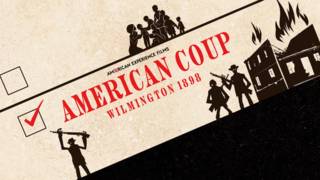
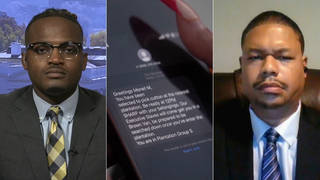





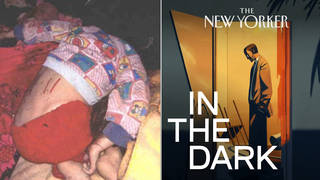
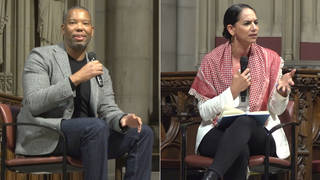
Media Options